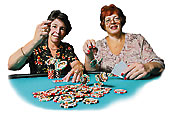
The
first ladies of poker
They're not interested in Vegas glitz, just the glory by CHUCK HOWITT WATERLOO (Jul 23, 2005) Jan Fisher has a tried and true way of telling when someone has been playing poker too long. "We call it the sniff test," she says, to loud laughs from the audience at a Waterloo luncheon yesterday. When a person's body odour gets so bad, you know it's time they threw in their cards, she says. Fisher's own personal record is 24 consecutive hours, but she hasn't done that in 20 years. Linda Johnson once played for 32 hours straight, and used to regularly play for 12 hours at a time when she started out in California because the betting limit was so low, it took that long to earn decent money. The Las Vegas-based pair don't have to log long hours at the gaming tables anymore because they're two of the most talented and successful poker players on the planet. They're also very shrewd business people who are being credited as the marketing geniuses behind the exponential growth of the world's largest online poker site -- partypoker.com. You'd never know that Johnson or Fisher are champion pokers players by looking at them. They are the antithesis of glitz and Vegas glamour. Dressed modestly in blouses and slacks, they look like your average next-door neighbour who would sit down for a game of hearts. Johnson's jacks to jackpots story started in Gardena, Calif., when she was 21 and working at the post office. She went to Vegas for a holiday and played some blackjack. She liked it. When she came home, her dad told her to switch to poker because it required more skill. She started reading books and taught herself the game. She played friends at work and pretty soon they didn't want to play her anymore. Nine years later in 1980, she was still at the post office. She entered a World Series of Poker event in Vegas, telling herself if she finished at least third she would quit her job and become a full-time player. She finished fifth, but quit anyway and moved to Vegas. Since then, she's "never looked back." She played for 12 years competitively and then went into the management side of the game. Now known as the "first lady of poker," she still plays three times a week when she's not travelling in order to stay sharp. In 1997, she became only the second woman in history to win a World Series of Poker open event. Johnson says any successful poker player must be: A mathematician to calculate card combinations and odds. A psychologist to read opponents. Of even temperament and patient. Aggressive and know when to bet big when the time comes. Fisher says the game has changed "exponentially" since she started playing in the 1970s. At that time, smoking, bad behaviour -- a player once urinated on a dealer under the table -- and "big house cuts" were commonplace. Big house cuts meant the casino took a healthy share of the pot. At one time, the drop slot was in the middle of the table slanted toward the dealer. When he or she pulled in the cards, some chips would fall into the slot, Fisher said to chuckles from the crowd. In the old days, when asked what she did for a living, Johnson said "mathematician or statistician." Fisher called herself a "croupier" in Vegas. The foreign language made it sound better. Now "it's an honourable industry," Fisher says. "It's finally earned the respect it deserves." They attribute the current poker boom to three things. Two years ago a Tennessee accountant named appropriately, Chris Moneymaker, turned a $40 Internet entry fee into a $2.5-million victory at the Word Series of Poker. Secondly, TV poker has taken off with the popularity of such shows as the World Poker Tour, on which Johnson and Fisher are announcers. The show's popularity has been helped by the "lipstick cam," a tiny camera in the table that shows the players' face-down cards. Lastly, online poker has become hugely popular. A few years ago, there were 30 games on the Internet. Now there are 300, Johnson says. When asked how long the poker boom can last, both are optimistic. Years ago the average age of a player was "deceased," Johnson quips. Now it's 20 to 22. The pair acknowledged that compulsive gambling is a problem that can't be ignored. It's a lot like alcohol and drugs, Johnson says, noting that there are more "compulsive bingo players" than poker players. But she said the industry has programs to treat gambling addicts. Indeed, the partypoker.com website has a section on responsible gaming. They were brought to Waterloo by entrepreneur and poker-playing enthusiast Tim Jackson to speak to Communitech, a group of business people from the local tech industry. Later they participated in a private poker tournament at a Waterloo restaurant. |